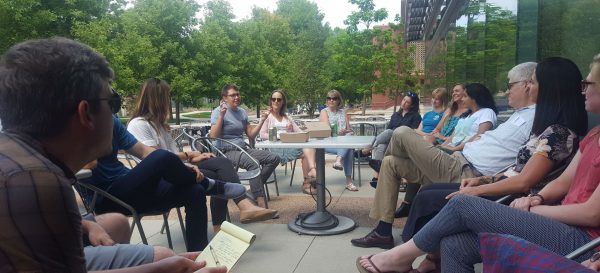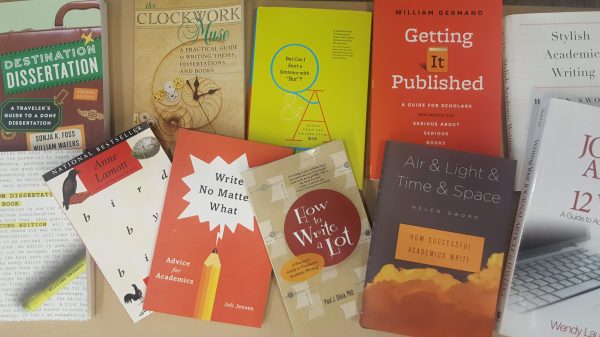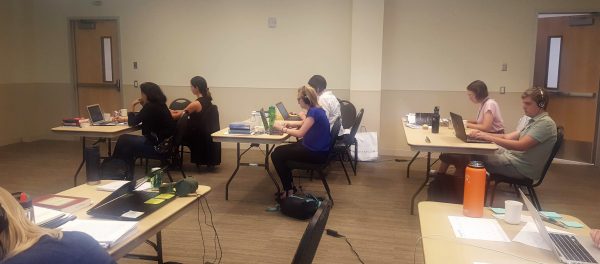The Department of Communication Studies hosted its first-ever week-long Summer Writing Retreat from Monday, July 23 through Friday, July 27, 2018, for faculty, graduate students and staff in the Lory Student Center at Colorado State University. The purpose of the retreat was to provide department scholars a structured and dedicated space for working on academic writing projects, such as master’s theses, conference papers, journal articles, book manuscripts, and project reports.
Twelve communication studies community members participated in the retreat, which was conceived of and organized by Assistant Professor Allison Prasch in consultation with Department of English faculty member and CSU Writes founder Kristina Quynn. The retreat featured two writing sessions per day, totaling more than 28 hours of writing across the week, as well as workshops on goal setting, creating a sustainable practice, and tackling large writing projects.
“Although we know as researchers and scholars that writing is important and in fact vital to our success in the academy, there is often little discussion about the mechanics of how to make this part of our daily practice,” Prasch says.
Prasch started developing the idea of the summer writing retreat during the 2018 spring semester as she started planning out her own summer writing schedule. “I knew that I’d be spending [the third week of July] working on my book project and thought that perhaps other graduate students, faculty, and staff might benefit from a communal space where we could write together.”
Retreat Design and Intention

The retreat opened on Monday with a presentation from Quynn on best practices for planning and achieving writing goals specific to the retreat, but applicable to any writing project. Quynn discussed strategies such as setting realistic goals, tracking progress, tracking energy levels, and recognizing and celebrating achievements.
“To write in healthy ways, rather than in cycles of avoidance, resistance, binge-writing to deadline, writers need both techniques as well as to get to know themselves and what works best for them individually,” Quynn says.
She encouraged participants to pay attention to their intellectual energy levels over the course of each day’s writing sessions so that they could leave the retreat with both pages produced and a better understanding of who they are as scholarly writers. When do they draft best? When do they edit best? When do they tip into exhaustion?
“Know what helps you thrive and pursue it,” Assistant Professor Meara Faw, both a retreat participant and workshop presenter, told other participants during her session on creating a sustainable writing practice. For Faw, that means being close to nature.
Kalie McMonagle, Center for Public Deliberation program coordinator and M.A. alumna, said she it was helpful to see Faw modeling her own advice. Instead of writing at one of the tables arranged classroom style in meeting room, Faw set herself up in the corner of the room, next to the floor to ceiling windows that look out onto the walnut trees bordering the edge of the Lory Student Center plaza.
Indeed, there may be no better way to become familiar with one’s writing habits than to devote an entire week to the activity.
“I’ve learned that I’m definitely a morning writer,” said second year M.A. student Brooke Phipps, who is looking at the intersection between digital communities and embodied protest specific to the 2017 Women’s March on Washington. Phipps says she’s also gleaned a lot of organizational wisdom from the various scholars and writers who participated.
“Taking an entire week to be intentional, not only in the act of writing, but the act of thinking about writing has been tremendously valuable to me,” said second year Ph.D. student Emily Amedee. “I do not create new content or generate quality ideas before 9:30 am, but my analytical and organizational brain is on fire during this time.”
Special faculty member Carolin Aronis was both surprised and encouraged to learn over the course of the week that the retreat helped her produce more writing than she would otherwise accomplish in her day to day life.
“I’ve learned that my writing needs good routine, actual assigned space and time,” said Aronis, who spent the majority of the week revising an article she submitted to the journal Discourse and Communication.
For Assistant Professor Kit Hughes, the week provided a much-needed space for working on a new article about market research firms that were founded in the 1970s to serve the nontheatrical film and video industries.
“The week-long retreat has been a great way to kickstart the write-up of this project,” Hughes said. “With a significant chunk of the writing now completed, I’ll be in a good spot to continue while my schedule fills with fall semester responsibilities.”
Building Community and Success
 Kristina Quynn founded CSU Writes in 2015 with a grant from the Ripple Effect, which is now The Women and Gender Collaborative. CSU Writes supports CSU faculty, postdoctoral fellows, and graduate students as they write for a variety of purposes, whether publication, proposal submission, or degree completion. The Graduate School, the Provost’s Office, and the Office of the Vice President for Research now fund the program, which served more than 750 people across campus in the 2017-18 school year.
Kristina Quynn founded CSU Writes in 2015 with a grant from the Ripple Effect, which is now The Women and Gender Collaborative. CSU Writes supports CSU faculty, postdoctoral fellows, and graduate students as they write for a variety of purposes, whether publication, proposal submission, or degree completion. The Graduate School, the Provost’s Office, and the Office of the Vice President for Research now fund the program, which served more than 750 people across campus in the 2017-18 school year.
According to Quynn, many of CSU Writes’s offerings are modeled on and inspired by programming at Duke, Stanford, UNC-Chapel Hill, MSU, and others. However, the way CSU Writes is organized is not a program model found elsewhere.
“The particular structure and arrangement of the writing retreats, for instance, are based on my own investigations into the research on writing in social spaces, advice from Joli Jensen (Comm Studies/Director of Faculty Writing at UTulsa), and refining the format based on evaluations and feedback from retreat participants,” says Quynn. “Show up & write, while inspired by Judy Bridge’s Shut Up & Write workshops, is unique to CSU.”
Perhaps also unique to CSU is the commitment that faculty in the Department of Communication Studies have made to improving their scholarly writing and consistently producing new work.
Communication Studies Professor and Department Chair Greg Dickinson coniders the summer retreat a natural extension of what he has long considered true. “This is a community that not only prides itself on its scholarly production, but on the quality of the writing we produce,” Dickinson said in an email interview.
He recalls gathering with other junior faculty in the department back in the early 2000s to workshop each other’s articles. “Nearly every one of the essays workshopped was published,” he said.
Move nearly two decades to the present day and two of those junior faculty members, Dickinson and Professor Karrin Anderson, have become editors of prestigious journals published by the discipline’s top organization, the National Communication Association. Dickinson is the current editor of Communication and Critical/Cultural Studies while Anderson will assume editorship of the Quarterly Journal of Speech in 2020.
“We have both been very active reviewers of essays and are regarded by current editors as some of the best reviewers of other’s work,” said Dickinson. “I think this is because we bring to our reviewing the same attention and care as we bring to our writing. We have both produced substantial bodies of work and work that is well regarded and frequently cited. Good editors are active writers.”
For Prasch, one of the main points of the retreat is to help foster productivity.
“My hope is that the writing momentum participants build during this week will translate into the rest of the summer and even into the fall semester and beyond,” Prasch says. “I especially hope that this experience will contribute to broader departmental efforts, such as our Ph.D. writing seminar, to help our graduate students build healthy writing habits now in support of their current academic endeavors, and also continue to shape their scholarly lives after they leave our program.”
Yet, as Dickinson intimated, quantity, while important, is not the writing endgame. Instead, it‘s a nuanced outcome resulting from a disciplined and intentional communal endeavor.
“It’s been valuable and meaningful to write in a space with my colleagues for a full week,” Prasch said. “Writing is, by its very nature, a solitary process, but it’s been a joy to write together and talk about our individual and collective experiences.”
